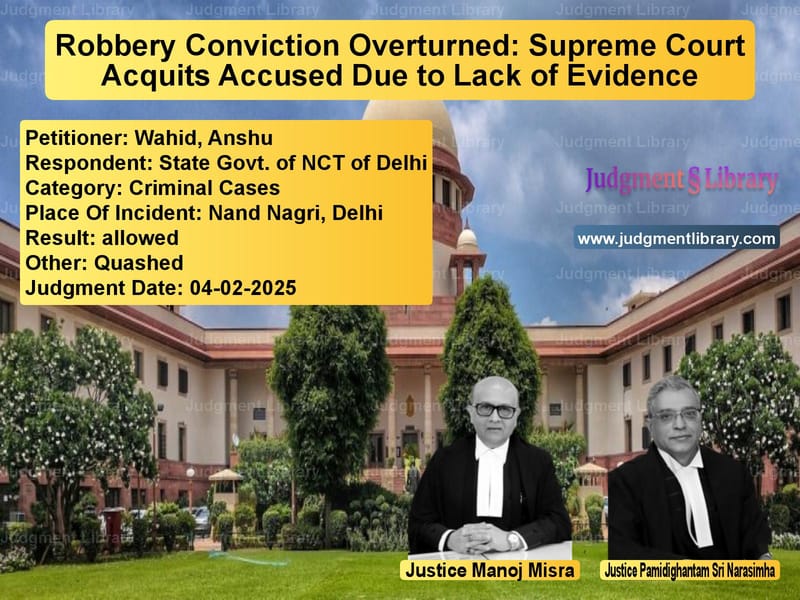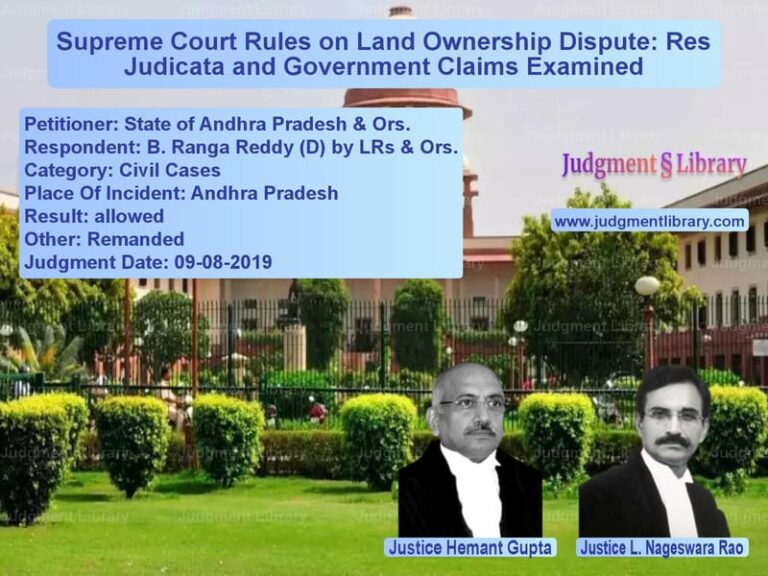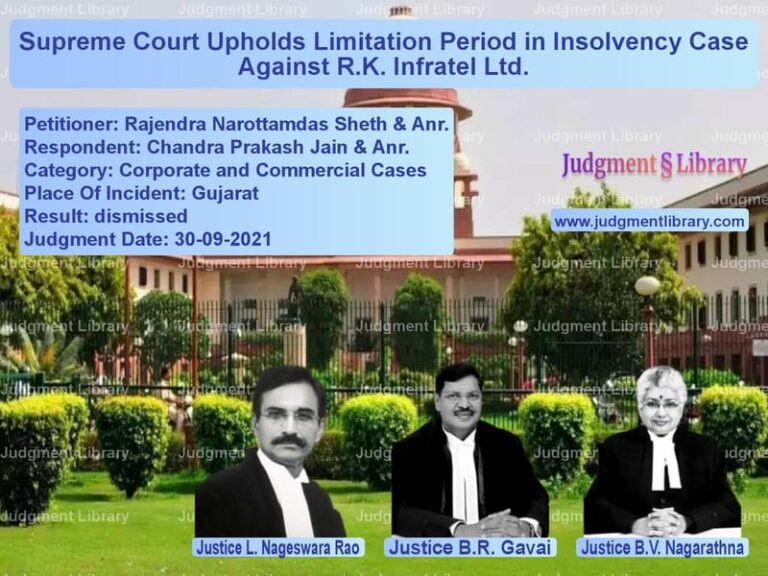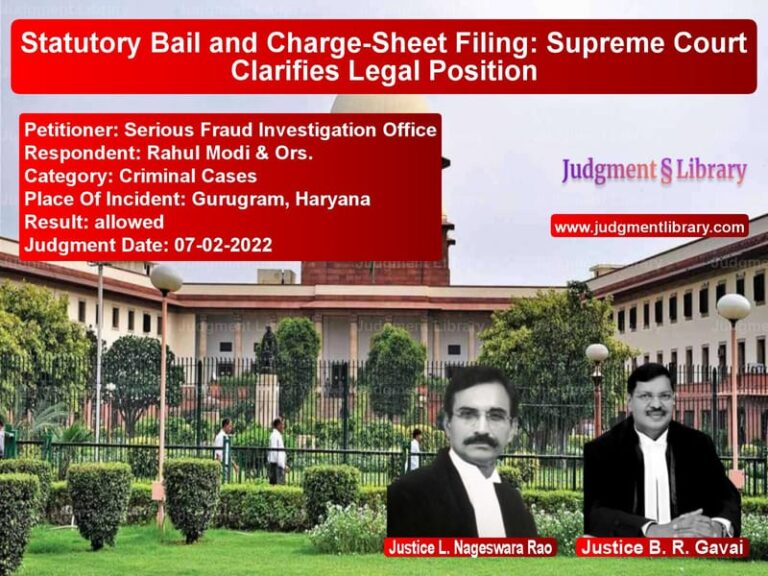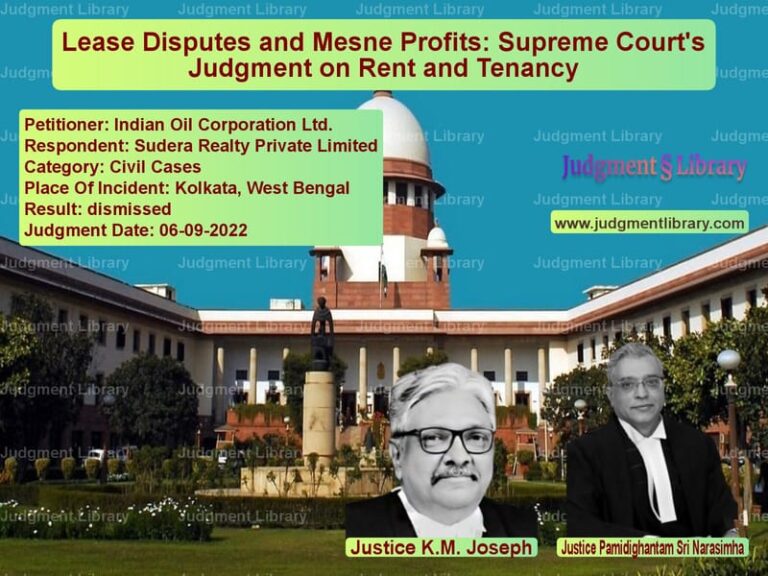Robbery Conviction Overturned: Supreme Court Acquits Accused Due to Lack of Evidence
The case of Wahid vs. State Govt. of NCT of Delhi and Anshu vs. State Govt. of NCT of Delhi is a significant ruling in criminal law concerning the reliability of witness testimonies and procedural lapses in robbery cases. The Supreme Court ruled on the legitimacy of the convictions under Sections 392/397/411 of the Indian Penal Code, 1860 and Section 25 of the Arms Act, 1959, ultimately acquitting the appellants due to insufficient evidence and procedural errors.
Background of the Case
The appellants, Wahid and Anshu, were convicted by the Additional Sessions Judge-04 (Shahdara), Karkardooma Courts, Delhi, in Sessions Case No. 78 of 2014. They were accused of being part of a group of four individuals who allegedly committed a robbery on December 3, 2011, in a Gramin Sewa mini-bus near Gagan Cinema, Delhi.
According to the prosecution:
- Four armed individuals boarded the bus at around 11:25 p.m. and allegedly robbed passengers of their mobile phones and cash.
- The accused were allegedly armed with a knife, screw driver, and a country-made pistol.
- The bus driver took the victims to a nearby police control room (PCR), where an FIR was lodged under FIR No. 512 of 2011 at Police Station Nand Nagri.
- Two days later, on December 5, 2011, the accused were allegedly arrested near a DTC Bus Depot at Nand Nagri based on the complainant’s identification.
Decisions by Lower Courts
The case underwent multiple stages of litigation:
- Trial Court (August 16, 2017): Convicted Wahid and Anshu under Section 392/397 IPC and sentenced them to seven years of rigorous imprisonment. Anshu was also convicted under Section 25 of the Arms Act and sentenced to three years of rigorous imprisonment.
- Delhi High Court (November 15, 2018): Dismissed their appeals and upheld the convictions.
- Supreme Court (February 4, 2025): Overturned the convictions and acquitted the appellants, citing lack of conclusive evidence.
Petitioners’ Arguments (Wahid & Anshu)
The defense argued that:
- The FIR did not name any accused as they were unknown to the victims.
- The alleged robbery took place at night, and no Test Identification Parade (TIP) was conducted.
- There was a significant discrepancy in witness testimonies, with some witnesses unable to identify the accused.
- No looted items were recovered from the accused, and the alleged recovery of weapons was dubious.
- The accused were arrested in a manner that appeared staged and improbable.
The defense counsel argued:
“The entire case is based on conjecture. There was no direct evidence linking the accused to the crime, and procedural lapses in identification make the prosecution’s case unreliable.”
Respondent’s Arguments (State Govt. of NCT of Delhi)
The prosecution countered with the following arguments:
- The complainant positively identified the accused at the time of arrest.
- Weapons similar to those described in the FIR were recovered from the accused.
- Even though some witnesses did not identify the accused, others confirmed their involvement.
The State’s counsel argued:
“The accused were apprehended based on the complainant’s statement, and sufficient evidence exists to confirm their guilt.”
Supreme Court’s Observations
The Supreme Court scrutinized the evidence presented and found significant discrepancies. The key observations included:
- The manner of arrest appeared dubious, as four unrelated individuals were allegedly found together at a bus depot just two days after the incident.
- The lack of a Test Identification Parade (TIP) weakened the credibility of witness testimonies.
- The recovery of weapons from the accused was questionable, as there was no proper documentation at the time of seizure.
- Multiple witnesses stated that the accused were not the ones who committed the robbery.
The Court ruled:
“When the prosecution case itself is riddled with inconsistencies, and procedural safeguards like test identification are ignored, the benefit of the doubt must go to the accused.”
Final Judgment
The Supreme Court ruled in favor of the appellants:
- The convictions under Sections 392/397 IPC and Section 25 of the Arms Act were set aside.
- The appellants were acquitted of all charges.
- Their bail bonds were discharged, and they were not required to surrender.
The Court concluded:
“The prosecution has failed to establish the accused’s involvement beyond a reasonable doubt. This Court cannot uphold a conviction based on mere suspicion and unreliable identification.”
Conclusion
This judgment underscores the importance of procedural safeguards in criminal trials. The ruling reinforces that:
- Convictions cannot be sustained without conclusive evidence.
- Test Identification Parades (TIPs) are crucial when accused are unknown to victims.
- Courts must meticulously evaluate witness testimonies before convicting individuals.
The Supreme Court’s decision reaffirms the principle that “it is better that ten guilty persons escape than that one innocent suffer.”
Petitioner Name: Wahid, Anshu.Respondent Name: State Govt. of NCT of Delhi.Judgment By: Justice Manoj Misra, Justice Pamidighantam Sri Narasimha.Place Of Incident: Nand Nagri, Delhi.Judgment Date: 04-02-2025.
Don’t miss out on the full details! Download the complete judgment in PDF format below and gain valuable insights instantly!
Download Judgment: wahid,-anshu-vs-state-govt.-of-nct-o-supreme-court-of-india-judgment-dated-04-02-2025.pdf
Directly Download Judgment: Directly download this Judgment
See all petitions in Fraud and Forgery
See all petitions in Theft and Robbery Cases
See all petitions in Judgment by Manoj Misra
See all petitions in Judgment by P.S. Narasimha
See all petitions in allowed
See all petitions in Quashed
See all petitions in supreme court of India judgments February 2025
See all petitions in 2025 judgments
See all posts in Criminal Cases Category
See all allowed petitions in Criminal Cases Category
See all Dismissed petitions in Criminal Cases Category
See all partially allowed petitions in Criminal Cases Category

